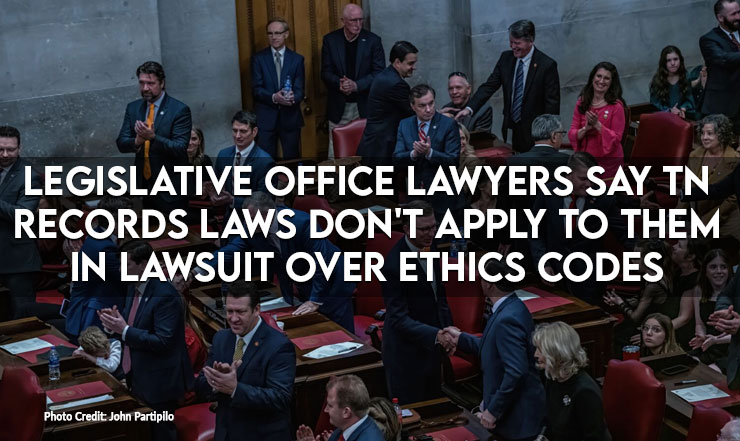Legislative leaders are fighting a request to provide more records related to a secret ethics investigation of former Rep. Scotty Campbell, who resigned after credible allegations that he sexually harassed at least one intern.
Photo: Members of the Tennessee House of Representatives greeting each other on opening day of session. Jan. 9, 2023. Photo Credit: John Partipilo
By Adam Friedman [Tennessee Lookout -CC BY-NC-ND 4.0] –
Lawyers for the Tennessee legislative office believe the state’s public records don’t apply to the legislative body, and it would violate the separation of government powers for a court to compel to release the documents related to their investigation into sexual harassment allegations against former Republican Rep. Scotty Campbell.
Attorneys for the Tennessee Office of Legislative Administration made these statements in a Davidson County Chancery Court filing last week in response to a lawsuit by Brian Manookian, who is seeking a broad array of public records related to the ethics investigations and personal schedules of top House officials.
The case also has the potential to widen the door on what records fall under the deliberative process privilege exemption, which Gov. Bill Lee has used to deny numerous public record requests by journalists.
News organizations around the state are also watching the case as they decide whether to challenge records denials by the legislative office to provide payment records that were part of the Campbell investigation.
Deborah Fisher, executive director of Tennessee Coalition for Open Government, said state law might allow for the withholding of details about Campbell’s victims, but the records of any payments should be subject to public records laws.
“By not releasing the records are we saying the legislative office can have a secret fund to spend money on whatever they want without anyone knowing,” Fisher said.

Manookian’s records request is broad
Manookian filed a public records request for various records, including documentation related to all sexual harassment investigations over the past two years and the calendars of House Speaker Cameron Sexton, Rep. Jeremy Faison and House Ethics Counsel Doug Himes from 2021 to 2023.Manookian is a Nashville trial lawyer known for his argumentative style and has been at the center of several high-profile lawsuits, but not without controversy.
The Tennessee Board of Professional Responsibility previously suspended his law license for improper communication with an opposing lawyer’s client.
The records request and the subsequent suit came weeks after Campbell resigned his Mountain City seat when news reports surfaced that he allegedly made vulgar comments and unwanted advances on at least one legislative intern. The state then spent money to relocate a woman.
The House Ethics Subcommittee — which has members from both parties — investigated the complaint against Campbell, finding the allegations true on March 29. But, the state House rules required the investigation results to be kept secret. Only after a NewsChannel5 report, three weeks later, did Campbell step down.
Manookian’s records request was expansive, but the suit could provide insight into the records legislative leaders believe the public shouldn’t have access to and reveal the limits of the state’s public records law on the legislative body.
House lawyers cited the deliberative process as one of the reasons the records should remain hidden. The deliberative process privilege is a court-allowed exception in the state public records laws to allow high-ranking government officials to block the release of documents related to their decision-making processes.
Lee has used this exemption to deny at least 60 records requests since he took office, according to The Tennessean.
But, the courts have yet to rule whether the deliberative process privilege pertains to other branches of the government.




2 Responses
Very nice coverup.
Strange how those that preach, ” no one is above the Law”, always place themselves above the Law.
The Legislative body might make the laws but they are not above the law as most think they are. TOU work for the Tax payers!!